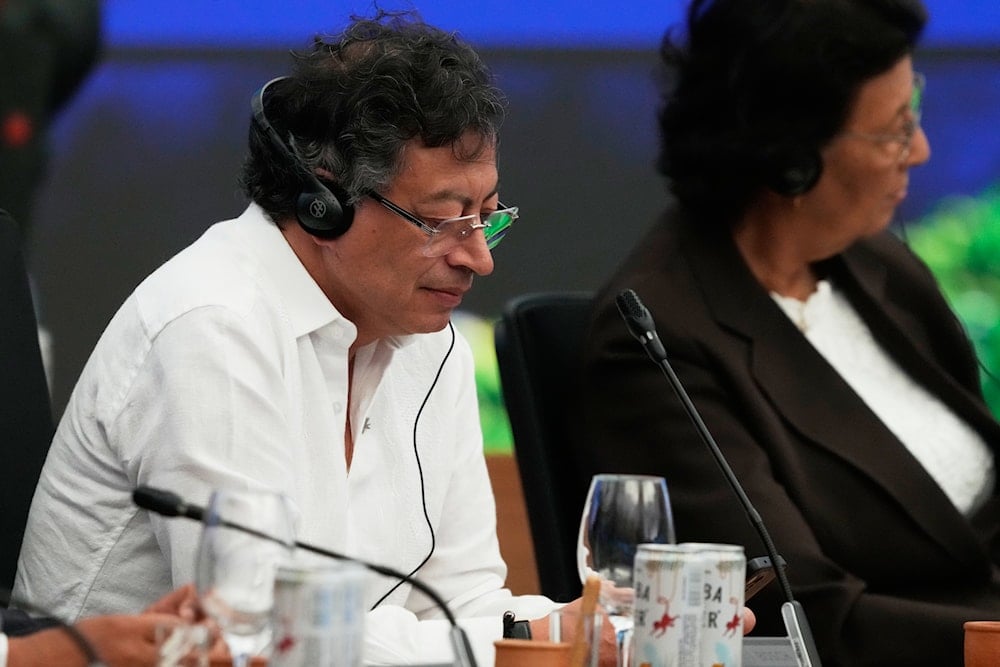Petro renews call for Gran Colombia union to unify Latin America
Colombia's president has renewed a call to revive Gran Colombia, a confederation of Latin American nations, echoing Simón Bolívar’s integrationist vision.
-

Colombian President Gustavo Petro attends a meeting with leaders of tropical forest countries and nations committed to investing in the Tropical Forest Forever Facility during the COP30 UN Climate Summit in Belem, Brazil, Thursday, Nov. 6, 2025 (AP)
The president of Colombia, Gustavo Petro, has renewed his calls for the formation of Gran Colombia, an EU-style union that would combine Venezuela, Colombia, Ecuador, and Panama.
"I propose to the peoples who inhabit this territory demarcated in 1819, to carry out, through constituent power and agreement between governments, the reconstruction of this idea which today would be a confederation of sovereign nations: Bolívar's idea of a Gran Colombia, with a common parliament and a collegial presidency as the European Union does," Petro said in a post on X.
Le propongo a los pueblos que habitan en este territorio demarcado en 1819, realizar a través del poder constituyente y el acuerdo entre gobiernos, la reconstrucción de esta idea qué hoy sería una confederacion de Nñnaciones soberanas: la idea de Bolívar de una Gran Colombia, con… https://t.co/wLZwjEgn1G
— Gustavo Petro (@petrogustavo) November 9, 2025
The plan was first proposed by Hugo Chavez in 2008, suggesting the reunification of Simon Bolivar's state; however, at the time, it failed to gain traction.
Back in May, the Colombian president advocated for the revival of Gran Colombia, a reference to the historic northern South American union originally spearheaded by the independence liberator Simón Bolívar.
Petro's call, Bolivar's dream
Petro argues that a confederation of Colombia, Venezuela, Ecuador, and Panama is necessary in the 21st century to act as a bulwark against common threats, including democratic backsliding, organized crime, and foreign interference.
Gran Colombia was formed after independence from Spain and lasted from 1819 to 1831, encompassing the territories of present-day Colombia, Venezuela, Ecuador, and Panama. Simón Bolívar had hoped to establish a strong, unified Latin American state capable of resisting external influence and avoiding internal conflict.
In 1819, in Angostura, the creation of the "Republic of Colombia" was proclaimed, and the Departments of Cundinamarca, Venezuela, and Quito were established, spanning from the Mosquito Coast and Costa Rica to the Amazon in the south and Guyana in the east. Panama would later join in 1822.
However, political rivalries and diverging national interests ultimately led to the republic's fracture and dissolution.
'Democratic deficits and latent threats of foreign intervention'
The Colombian president now perceives a comparable opportunity, as well as a threat, and in his May message, he characterized the region surrounding Colombia as being plagued by "structural problems of violence," in addition to "democratic deficits and latent threats of foreign intervention."
He specifically pointed to a combination of factors, including economic blockades that have contributed to rising poverty and the growing presence of foreign military activity near the Panama Canal.
Gran Colombia would function as a confederation designed to respect each nation's autonomy, according to Petro, while simultaneously promoting integration through shared trade agreements, common citizenship, mutually recognized academic accreditation, and unified digital infrastructure, even suggesting the possibility of a virtual common currency and the establishment of a regional parliament.
Feasibility issues
Despite drawing attention, Petro's proposal faces questions of feasibility.
The countries once part of the original union now have different political systems, institutions, and national priorities, making coordination complex. Their economies also vary in size, structure, and currency, which complicates efforts to build a unified market. Establishing new regional institutions would require a broad consensus on governance, migration, trade, and security, areas already covered to some extent by existing organizations such as the Andean Community and the Pacific Alliance.
Moreover, most governments in the region are currently focused on domestic reforms and social stability, leaving limited space for ambitious regional projects. While the idea of Gran Colombia remains symbolically powerful, turning it into a practical framework for integration would demand a level of alignment that is difficult to achieve in today’s diverse regional landscape.
However, Petro remains undeterred, pointing to Colombia's existing open diplomatic channels and collaborative work with neighbors on issues like narcotrafficking and border security as a foundation for his ambitious confederation.

 4 Min Read
4 Min Read








